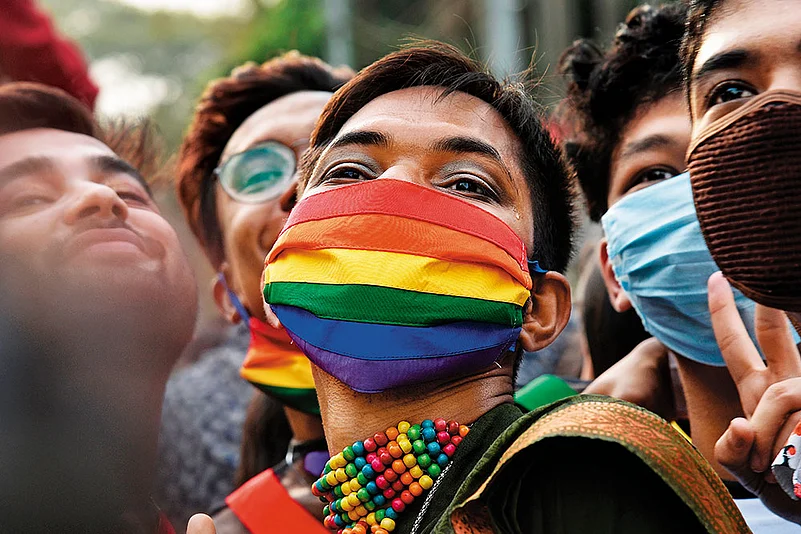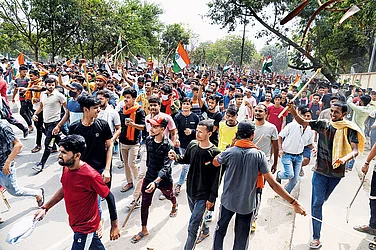For decades now, popular culture in India has portrayed the transgender community as either scary and villainous or comic relief for a largely cisgender heterosexual audience. Over the years, there has been a gradual shift in how the community has been portrayed.
“All of this has not happened because of policies but persistence of people,” says Zainab Patel, a transgender woman who was recently appointed as the chief of diversity and inclusion at Pernod Ricard India.
Having said that, there has been hardly any artistic portrayal of such characters manoeuvring the workspace. This has a lot to do with the invisibility of the community in everyday, mainstream job roles.
An Uneven Playing Field
As per the 2011 census, there were 4.88 lakh transgenders in India. A whopping 96% are denied jobs and are forced to take up low-paying or undignified work like badhais (blessing during festivities), sex work and begging to sustain, revealed a 2018 study conducted by the National Human Rights Commission.
Access to corporate or mainstream workspaces is still largely a function of privilege within the community. “The concept of meritocracy does not hold in a situation like this. The concept of equity applies here. Visibility in decision-making roles still does not exist. I did not face any discrimination. My language and my upbringing make me privileged. But can this be said about everyone? Definitely not,” says Patel, adding that a conscious change towards inclusivity has been marginal.
Today, a major reason behind companies looking at inclusive workspaces is that globally, MNCs are driving diversity as a focus area. “Their Indian counterparts are then getting pushed to hire more from an ED&I perspective. Government regulations do help corporates in modifying policies in line with the needs of the community,” Anjali Raghuvanshi, chief people officer, Randstad India, says, while talking about equality, diversity and inclusion (ED&I) policies in the corporate sector.
However, there are structural roadblocks. For example, most organisations have medical check-ups as pre-joining formalities. While hiring a transgender woman, the way the information has to flow out to the hospital is different from how it flow otherwise. Unfortunately, these things are still not part of the system. Neither are hospitals prepared nor are the organisations,” says Raghuvanshi.
Insurers’ Apathy
Another important aspect that remains unaddressed is the medical needs. Gender reassignment surgery is not included in the essential procedures that are covered by the medical insurance offered by companies. “Gender change surgery or cosmetic surgery is not covered as part of corporate insurance provided by companies to employees in a normal cover. The insurance cover for transgenders are the same as the ones given to customers. Unless corporates request for such coverage, normal policies won’t include it. If they require it, we may consider it but 99.9% times this requirement doesn’t come,” says a senior officer with a private insurer. On one hand there is lack of demand while on the other disbursement of insurance money is also prohibitive for transgenders in India.
“Insurance companies and regulators have been progressive. Where the lack creeps in is in the traditional distribution channels,” Raghuveer Malik, head corporate insurance, Policybazaar, says.
Sensitising employees is a big challenge. “I know a transgender person who landed a good job at one of the biggest companies and her colleagues would not sit at the same table to have lunch with her. What is needed is umbrella anti-discriminatory policies,” says Sushant Divgikar, who also goes by the moniker of Rani KoHEnur, his popular drag queen avatar.
To address this, companies are turning to ally networks. “When you are calling a member of the community for an interview, it is imperative that an ally (from within the community) would be there on the location to ensure the process goes smoothly. The ally’s job should be to ensure that those who would sit around the transgender employee have a bit of gender education,” says Raghuvanshi.
Education, Employment, Empowerment
In 2014, the Supreme Court passed the historic NALSA judgment and recognised transgender people as the third gender. “In view of the NALSA judgement, the Transgender Persons (Protection of Rights) Act, 2019 was passed. The intention was [to ensure] welfare, inclusion and protection of transgender persons in the mainstream society,” says Soumi Guha Thakurta, an advocate at the Calcutta High Court.
Acceptance is still an issue and education levels are mostly low, says Anjali Gopalan, executive director, Naz Foundation. “There is a lot of discrimination—both from school authorities and bullying by other children. Most transgender children drop out of schools not because they want to, but because they can’t stay on in that kind of a violent environment,” she rues.
The apex court had also directed the Centre and state governments to treat transgenders as a socially and educationally backward class and extend reservations in education and employment. In July, Karnataka became the first state to notify 1% reservation for the community in public jobs. The Rajasthan High Court has also directed the state government to ensure reservation for transgenders in government jobs.
“The initial challenge to fill up government vacancies would be to find enough qualified transgenders. But once this reservation is in place, more people would get trained and be available. So, reservation for transgender people is a move in the right direction,” says Anil Swarup, former secretary, department of school education and literacy, Ministry of Education.































